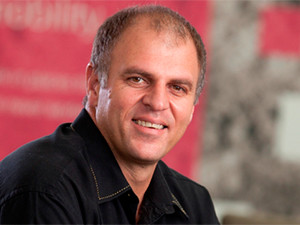
"ICT has the potential to be far more than just a business enabler. In fact, technology in South Africa can be instrumental in nation-building." This is the view of Gert Schoonbee, Managing Director at T-Systems, who spoke at The Human Capital Engine's recent 'Nation Building in SA Conference' in Johannesburg. The event connected C-level executives from various local companies, and explored the evolving role of private enterprise in developing our country - 20 years after the birth of a democratic South Africa.
"You cannot talk about nation-building in the third person and remain authentic," noted Schoonbee, explaining the details of T-Systems' 'nation-building' programme within its 2 000-employee South African division.
"We wanted to move past the fallacy that nation-building is something we as individuals cannot accomplish - that it can only be done by heroic figures and icons. We wanted to illustrate that it affects us all, that it is not 'something that needs to be done for someone else'.
"T-Systems' programmes have emphasised the nation-building efforts that can be done on an individual level, on a day-to-day basis. The vision is that T-Systems becomes a microcosm of the country we want to become," he explained.
"Through its key accounts, the ICT company plays a critical role in areas such as ensuring well-functioning trade ports across South Africa's coastline, providing high levels of electricity availability despite a tough operational climate, ensuring SA can transact with the world via sophisticated financial trading desks, and keeping production lines up and running for us to export goods.
"All of these are, in essence, nation-building activities," he said.
"Our cultural programme looks at these achievements and emphasises that staff are making a meaningful contribution to themselves, colleagues, customers, and then outside of the organisation: their families, communities, and the broader society at large," noted Schoonbee.
However, change does not come easily. At T-Systems it began with breaking down some of the barriers between people. "We spend so much time at work, knowing each other, but at the same time, not knowing each other," said Schoonbee.
"Our values, beliefs and identity are a result of our entire lives: where we have come from and everything we've experienced. In order to truly trust someone and work together as one, we need to truly understand that person."
In October this year, when the new Broad Based Black Economic Empowerment Codes come into effect, the spotlight will once again be directed at issues of transformation. But Schoonbee believes that if we define transformation as simply 'adhering to these codes', we are not grasping the issue fully.
Transformation is about being instrumental in building a nation for those around us, transforming people's lives through our actions, he continued.
With this in mind, the new culture of T-Systems actively seeks ways to do this. From its learnership programme that's trained over 1 500 people in recent years (many of which went on to formal internships and ultimately permanent positions within the organisation), to its Digital Learning Centre in the small rural town of Hazyview in Mpumalanga, nation-building remains at the heart of activities.
"This is a continual journey," Schoonbee concluded. "We need to keep working on it, and find strength and energy from each other - but so far, the change has been incredible."
T-Systems is a finalist in the 13th Annual Oliver Empowerment Awards in the category Skills Development for organisations with a turnover of over R1 billion, as well as the Enterprise & Supplier Development category.
Share
Deutsche Telekom
Deutsche Telekom is one of the world's leading integrated telecommunications companies with over 142 million mobile customers, 31 million fixed network lines and more than 17 million broadband lines (as of 31 December 2013). The group provides fixed network, mobile communications, Internet and IPTV products and services for consumers and ICT solutions for business customers and corporate customers. Deutsche Telekom is present in around 50 countries and has approximately 229 000 employees worldwide. The group generated revenues of EUR 60.1 billion in the 2013 financial year - more than half of it outside Germany.
T-Systems
Drawing on a global infrastructure of data centres and networks, T-Systems operates ICT systems for multinational corporations and public sector institutions. T-Systems provides integrated solutions for the networked future of business and society. Some 50 000 employees at T-Systems combine industry expertise and ICT innovations to add significant value to the digitisation strategies and core business of customers all over the world. T-Systems generated revenue of around EUR 9.5 billion in the 2013 financial year.
Since the inception of T-Systems in South Africa in 1997, the company has cemented its position as one of the most successful T-Systems companies outside of Europe. A leading ICT outsourcing service provider locally, T-Systems offers end-to-end ICT solutions in both the ICT operations and systems integration markets. Its extensive portfolio of services covers the vertical, horizontal, IT and TC space. T-Systems South Africa's head office is located in Midrand with another major office in Cape Town, and 20 further representative offices in locations throughout southern Africa.
Editorial contacts